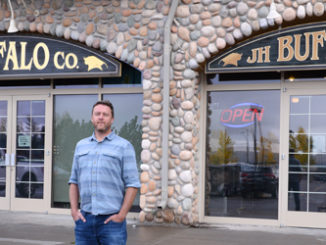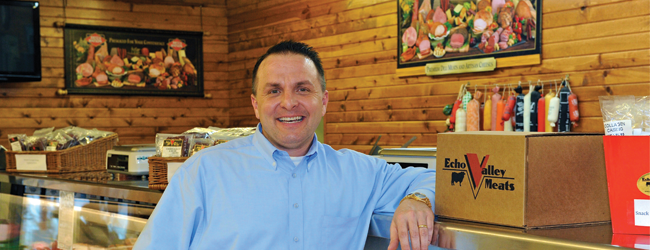Is there anything that you wish you could do over? Any regrets or second bites at the apple?
Not really. I tell my dad, when I die, I want to come back as me. The mistakes are just part of the game. I’ve had money stolen from me; I’ve had government agencies come after me; I’ve been honest and above-board on everything; and I’ve worked my ass off. The people who have supported me have been rewarded. I’ve never taken anything from anyone that I didn’t give back. I feel good. I’m far from perfect. I’m sure there are people who have worked for me that might say, “Ah, he was a lousy boss.” But, I learn from my mistakes.
Do you still hold the world record for the largest single e-commerce transaction?
I think so. It’s funny because I didn’t even look at it that way. I just thought it was practicing what I preached when I bought the Gulfstream online. One of my drinking buddies came to me with a copy of the Guinness World Records and said, “Look, you’re in it!” I wondered, for what? It was for the largest online purchase. That’s cool and it’s something I’m proud of.
For many that was their first introduction to Mark Cuban.
I guess. [smiles]
What’s it like being famous or infamous? What’s the upside and the downside?
The upside is you get good seats at restaurants and people tend to be overly nice to you. I suppose the downside is you have to—particularly at the beginning— negotiate things with friends and family and establish some ground rules. My bank account doesn’t define me. If you treat me the same way you did before I had money, we’re going to continue to be friends. If you look at me as a meal ticket, we’re not going to be friends. Our relationship has to be the same. Early on, that was difficult. I remember I had one friend who sent me a letter—he didn’t call me, but sent me a letter—asking for $275,000. I haven’t seen him or talked to him since. I have a lot of other friends that ran into rough times and they never asked me for a nickel, but I was happy to help them. I gladly volunteered to help.
In the beginning, it was about saying to people that I’m the same. The same things I was stupid and goofy and idiotic about before are still who I am. I’m still a slob and that’s not going to change. I want to relate to my family and friends the same. If you can deal with that, great! If not, you’ll just have to get over it.
Our previous cover story interview was with Ben Stein. I’ve had lunch with him a few times since our initial interview. During one of our discussions, your name came up as our next cover story. He told me he had fond memories of working with you on Star Search, where you were a producer. Intertwined amongst your many endeavors, you have an obvious passion for production such as HDNet, Magnolia Pictures and Landmark Theatres, to name a few. Where does that stem from? That seems different than IT.
It is and it isn’t in that I’ve never visualized myself as a creative guy. I always thought there were a lot of people more creative than me. I always felt that technology could radically change production and distribution. My partner, Todd Wagner, wanted to do the producing from the creative side and get involved with creative people. My thought was we could change the way movies are created and distributed—television as well. So, that’s what got us into HDNet and got us into 2929 and Magnolia Pictures. We’ve always looked at problems, or looked at the way things were always done and asked, “Can we do it better?” We weren’t going to hold on to the old ways or the way they’ve always been done. It’s paid off. All those companies are profitable.
In what order of importance would you place technical understanding, instinct, creativity and the belief that you can do something? What is most important?
Passion and self-honesty are most important. I think it’s important to know your strengths and weaknesses and know what you enjoy doing. If you look at it as only a job, you’ve already lost. It’s not going to be your passion and you’re going to count the hours. If you look at it as something you love to do and you know what your strengths are, then you can leverage those strengths in your business and in helping others. Once you recognize your weaknesses, then you can work with people that complement you. In each of my businesses, I’ve had a partner who’s very anal to strengthen where I am weakest. Martin Woodall and Todd Wagner are incredibly anal people, perfectionists, because I’m a slob. I’m a big-picture, think about what’s around the corner, how’s technology going to change, how can I change this industry kind of guy. I recognize the need for someone to be there to dot the I’s, cross the T’s and keep me at the baselines. Recognizing my weaknesses is just as important as recognizing my strengths and my core competencies.
You obviously think outside the box. Your entrepreneurial approach is far from the status quo. You push the outer limits. Anyone who’s followed your career recognizes this. It is interesting you own a team named the Mavericks. Do you attribute your success, in part, to blazing trails instead of following them?
Absolutely. When I look at it, one of my biggest strengths has been being able to see around the corner and see what’s next. It’s attributable to taking the time to learn the technology and putting myself in the shoes of various businesses and asking, “How would I run their businesses differently?” Whether it was in the early 80s, being one of the first system integrators for Local Area Networking, to people who were saying, “Do I even need a PC?” We were learning how to connect them, how to write software for them and taking the next step—that being going nationwide and doing it on a bigger scale than most. A prime example would be Broadcast.com starting off as Audionet when everyone else just wanted to get on the Internet with text. I asked myself, “How can we take audio and then video to and across the Internet—what can we do differently?”
There was some skepticism about how to stream radio and television on the Internet, just look at YouTube today. We had nice proof of concept, but where we really made our money was in the value of real-time communications— things that most take for granted, such as quarterly earnings conference calls and group meetings that are done online. No one had done those things and we saw there was a real business value there. We can help make businesses more productive and more competitive and give them a profit advantage by leveraging this technology—getting a leg up on things that people hadn’t considered. When we started HDNet, many looked at the $10,000 cost of a high-definition screen as an impractical hurdle to penetrate markets. Many believed there was no way HD would ever become ubiquitous or become cheap enough for the general consumer. I looked at HD’s future to follow what happened to the PC. I said it’s going to follow the same price performance curve; it’s going to get bigger, cheaper, faster. At the time, no one believed me and, low and behold, it happened faster than I imagined. It helped us create HDNet. Now, with Magnolia Pictures, we’re distributing movies where we’re putting movies on digital VOD
, on cable, satellite and Telco platforms, for traditional TVs three to four weeks before they’re in theaters.
It looks as though bandwidth has changed the shape of everything. Hasn’t it cracked the VOD market wide open?
Back then, I looked at future capability differently than the rest of the world. Even now, everyone thinks the Internet is the solution to everything. My attitude has always been, if everyone’s looking somewhere, that’s not the place where the real solutions are. Right now, I think the best bandwidth and the most available bandwidth for content is on digital cable, satellite and Telco platforms. So, we’re taking our movies and making them available for VOD a month before they’re in theaters. We don’t have to spend the big P&A [print and advertising]; we don’t need the big marketing budgets. The cable and satellite providers do that for us. We’re generating revenue before it hits theaters; and then, all that word-of-mouth and discussion helps us in the theaters. So now—Magnolia, in particular—almost all of our movies make money, which is unheard of. My real strength has been being able to say, “If everyone else is looking here, let’s look somewhere else. Let’s see if we can apply technology to do it a little differently and look at it a bit differently and a bit cynically to change the motto.” That’s what’s worked for me.
Telephony is probably going to go that way, would you agree?
Exactly.





I remember a few years ago, Cuban offered to buy the Pittsburgh Pirates. I wish they would have left him buy them. He probably would have turned the team into a winner.
What a fantastic post. I spend hours on the internet reading blogs, about tons of different subjects. I have to first of all give kudos to whoever created your theme and second of all to you for writing what i can only describe as an unbelievable post. I honestly believe there is a skill to writing articles that only a few posses and frankly you have it. The combination of informative and quality content is definitely extremely rare with the large amount of blogs on the internet.
great interview. it’s a peak into the mind of a billionaire. It’s like a comprehensive course on the habits of a highly successful entrepreneur, and it’s worth every penny you pay for the course. we are so lucky it’s available online.